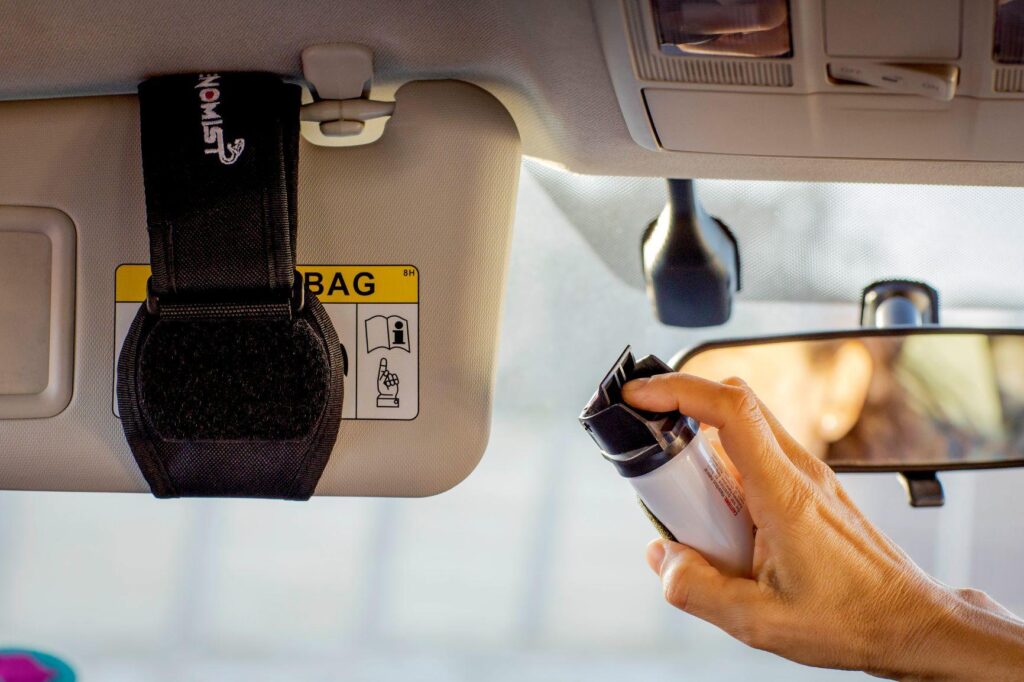Table of Contents
- The Risks of Heat Damage and Reduced Effectiveness
- Legal Implications of Leaving Pepper Spray Unattended in Your Vehicle
- How Temperature Fluctuations Can Cause Accidental Discharge
- Best Practices for Safely Storing Pepper Spray Outside Your Car
- In Retrospect
The Risks of Heat Damage and Reduced Effectiveness
When pepper spray is left in a hot car, the extreme temperatures can cause significant degradation to the canister and its contents. The propellant inside, which is responsible for dispersing the spray, can expand or even rupture under high heat, compromising the device’s integrity. This not only poses a safety hazard but also reduces the spray’s reliability when you need it most. Exposure to heat can lead to leakage, clogs, or a complete failure of the spray mechanism, leaving you vulnerable in a critical situation.
Beyond the physical risk to the canister, the chemical potency of pepper spray diminishes over time when exposed to heat. Factors such as UV radiation and temperature fluctuations can break down the active ingredients, drastically lowering the spray’s effectiveness in incapacitating an attacker. Consider that pepper spray is your last line of defense; trusting a compromised canister could result in:
- Reduced concentration of irritant compounds, making it less effective
- Inconsistent spray patterns, hindering accurate targeting
- Potential malfunction during deployment in emergencies
For these reasons, always store pepper spray in a cool, shaded place and avoid leaving it inside your vehicle, especially during scorching summer months. Prioritizing responsible storage ensures it remains a dependable personal safety tool when you need it most.
Legal Implications of Leaving Pepper Spray Unattended in Your Vehicle
Storing pepper spray unattended in your vehicle can lead to significant legal consequences depending on local and state regulations. Many jurisdictions have specific laws that regulate the possession, transportation, and storage of self-defense sprays, often placing strict limits on where and how these items can be kept. For example, certain states consider leaving pepper spray in an unattended car a form of negligent possession, which could potentially result in fines or even confiscation of the device. It’s essential to understand that these laws can vary widely, and ignorance of local statutes is rarely accepted as a defense in court.
Legal risks include:
- Potential fines or citations for improper storage.
- Loss of right to legally carry pepper spray in the future.
- Increased liability if the spray is used unlawfully or falls into unauthorized hands.
By keeping pepper spray securely on your person or in a locked container when not in immediate use, you minimize these risks and ensure compliance with legal requirements. Additionally, this precaution helps prevent theft or misuse, which can have far-reaching legal ramifications beyond simple possession violations.
How Temperature Fluctuations Can Cause Accidental Discharge
When exposed to extreme changes in temperature, the canister inside the pepper spray can become highly unstable. Heat causes the canister to expand, increasing the internal pressure beyond safe limits. Conversely, cold temperatures make the propellant contract, which can affect the spray mechanism’s integrity. These rapid expansions and contractions wear out seals and components, making accidental discharge more likely, especially if the spray is jostled or bumped inside a car.
Moreover, a vehicle’s interior often experiences dramatic temperature swings-from scorching heat under direct sunlight to freezing cold overnight. This cyclical stress can:
- Compromise the valve system, causing it to malfunction
- Trigger unexpected release when the canister is moved or dropped
- Reduce the reliability and effectiveness when you actually need it
Protecting yourself means protecting your pepper spray by storing it in a stable environment rather than leaving it exposed inside your vehicle.
Best Practices for Safely Storing Pepper Spray Outside Your Car
To ensure your pepper spray remains effective and ready for use, it’s essential to store it in a location that avoids extreme temperatures and direct sunlight. Leaving it inside your car exposes the canister to heat fluctuations and UV rays that can degrade the formula, potentially causing the spray to leak, malfunction, or lose potency. Instead, consider carrying pepper spray on your person or placing it in a secure, cool spot outside your vehicle, such as your handbag, pocket, or a keychain holder within easy reach.
Here are some practical tips to keep in mind when storing your pepper spray safely outdoors:
- Always keep it accessible and secure-avoid burying it deep in a bag or drawer where it might be hard to reach quickly.
- Use protective cases designed to shield the spray from weather elements and accidental discharge.
- Regularly check expiration dates and inspect the canister for any signs of damage or leakage.
- Avoid extreme environments such as leaving it on a hot dashboard during summer or outside in freezing temperatures.
In Retrospect
In conclusion, while pepper spray can be an effective self-defense tool, storing it inside your car poses significant risks that are often overlooked. Extreme temperatures can compromise its integrity, rendering it useless exactly when you need it most-and in some cases, create a safety hazard. For reliable protection, it’s best to keep your pepper spray on your person or in a temperature-controlled environment. Being mindful of proper storage not only ensures your safety but also maximizes the effectiveness of this important defense tool. Stay informed, stay prepared, and prioritize your safety above all.Check Our Other Blogs
- StunGun – Your Trusted Source for Stun Guns, Laws, and Self-Defense Tips
- PepperSprayLaws – Your Trusted Resource for Pepper Spray Information
- StunGunLaws – Your Trusted Guide to Stun Gun Legality and Safety




